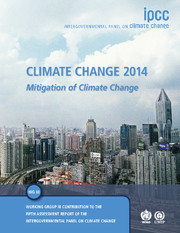 Climate Change 2014: Mitigation of Climate Change
Climate Change 2014: Mitigation of Climate Change Summary for Policymakers
from Summary for Policymakers
Published online by Cambridge University Press: 05 February 2015
Summary
Introduction
The Working Group III contribution to the IPCC's Fifth Assessment Report (AR5) assesses literature on the scientific, technological, environmental, economic and social aspects of mitigation of climate change. It builds upon the Working Group III contribution to the IPCC's Fourth Assessment Report (AR4), the Special Report on Renewable Energy Sources and Climate Change Mitigation (SRREN) and previous reports and incorporates subsequent new findings and research. The report also assesses mitigation options at different levels of governance and in different economic sectors, and the societal implications of different mitigation policies, but does not recommend any particular option for mitigation.
This Summary for Policymakers (SPM) follows the structure of the Working Group III report. The narrative is supported by a series of highlighted conclusions which, taken together, provide a concise summary. The basis for the SPM can be found in the chapter sections of the underlying report and in the Technical Summary (TS). References to these are given in square brackets.
The degree of certainty in findings in this assessment, as in the reports of all three Working Groups, is based on the author teams' evaluations of underlying scientific understanding and is expressed as a qualitative level of confidence (from very low to very high) and, when possible, probabilistically with a quantified likelihood (from exceptionally unlikely to virtually certain). Confidence in the validity of a finding is based on the type, amount, quality, and consistency of evidence (e.g., data, mechanistic understanding, theory, models, expert judgment) and the degree of agreement. Probabilistic estimates of quantified measures of uncertainty in a finding are based on statistical analysis of observations or model results, or both, and expert judgment. Where appropriate, findings are also formulated as statements of fact without using uncertainty qualifiers. Within paragraphs of this summary, the confidence, evidence, and agreement terms given for a bolded finding apply to subsequent statements in the paragraph, unless additional terms are provided.
Approaches to climate change mitigation
Mitigation is a human intervention to reduce the sources or enhance the sinks of greenhouse gases.
- Type
- Chapter
- Information
- Climate Change 2014: Mitigation of Climate ChangeWorking Group III Contribution to the IPCC Fifth Assessment Report, pp. 1 - 30Publisher: Cambridge University PressPrint publication year: 2015
- 210
- Cited by


